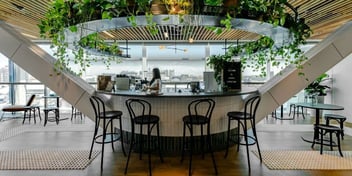In a workplace, ‘ownership’ can mean different things: taking responsibility of your work, physically owning a space in decorating your workspace, and the power you have in making decisions. For us, ownership is about all of these things. It’s about feeling valued in the work environment and like an integral part of the team.
But why is feeling like you own your job important?
When we go to work, we don’t want to feel like we are imposters in an unfamiliar environment. Studies have shown that employees who feel estranged from the work environment can feel the need to “surface act”, leading to attention diverted from their tasks and responsibilities.
This affects the organisation negatively as it reduces employee engagement and productivity levels – therefore, the mental wellbeing of the employee is impacted because they feel a lack of connection to their workplace. However, there are some employee engagement strategies to rectify this. On a wider scale, combating this could be as simple as changing the floor plan of your office to encourage wellbeing at work. There are methods to create a more connected workplace by doing away with the traditional cubicle-style office and implementing a more modern open plan office.
On a smaller scale, employers should make conscious effort to allow their employees a sense of control. For instance, allowing freedom within an owned space to help boost employee engagement.
Each employee may have a designated station where they carry out the brunt of their work. Allowing employees to decorate and use this space as they want – displaying family pictures, colour-coordinated office supplies and even incorporating plant life – gives them a separate and comfortable space they can feel at ease in and productively carry out their work.
Read more: Marking your territory: why personalisation is important
Alternatively, for offices that employ hot-desking, employees should be encouraged to use their chosen space how they want and when they want. A part of this new concept is Activity Based Working, which allows employees to work on what they want, where they want, when they want.
If employees feel completely responsible for the work they are undertaking, they are more likely to perform excellent-quality work because they have taken more time to research and perfect it, employee satisfaction levels will be higher, and they will demonstrate more initiative concerning tasks.
A study by IFMW Sweden and Leesman surveyed 70,000 employees in 575 workplaces and saw a marked difference in employee engagement when working in an ABW-style office environment compared to those within a traditional one. There was a 22% increase in satisfaction in creative thinking for individuals in a more open work environment, as well as a 27% difference in satisfaction for individual work focused away from the desk.
While ABW might not be the perfect work solution, it certainly allows employees a level of ownership they might not feel within a traditional office layout.
Where these traditional office layouts – cubicles, less natural interaction with colleagues – make communication difficult, modernised offices enhance communication channels and allow for input from team members.
If employees have a say in strategy, projects and other processes that impact on their work, even giving feedback to their managers and bosses, they are more likely to want to own bigger roles and responsibilities in future. Additionally, staff retention is likely to increase as employees feel more valued. A survey by the O.C. Tanner Institute showed that employees who feel undervalued and disempowered by their employers are less likely to be productive and satisfied at work.
With staff turnover rates at an approximate 18%, costing about $1 million per year for companies with 100 employees, the financial situation for organisations is serious for those ignoring employee wellbeing.
If employees feel as if they are unable to communicate with their colleagues and managers freely, this affects the overall satisfaction of the employee because they feel they do not own their job role or projects, despite the effort they spend on them.
Employees should be feeling as if they own their jobs, their space and themselves in the work environment and employers should look at physical design to help implement these behavioural changes.
Axiom designs office workspaces to increase a sense of employee engagement, ownership and productivity. Find out how by contacting us today.






